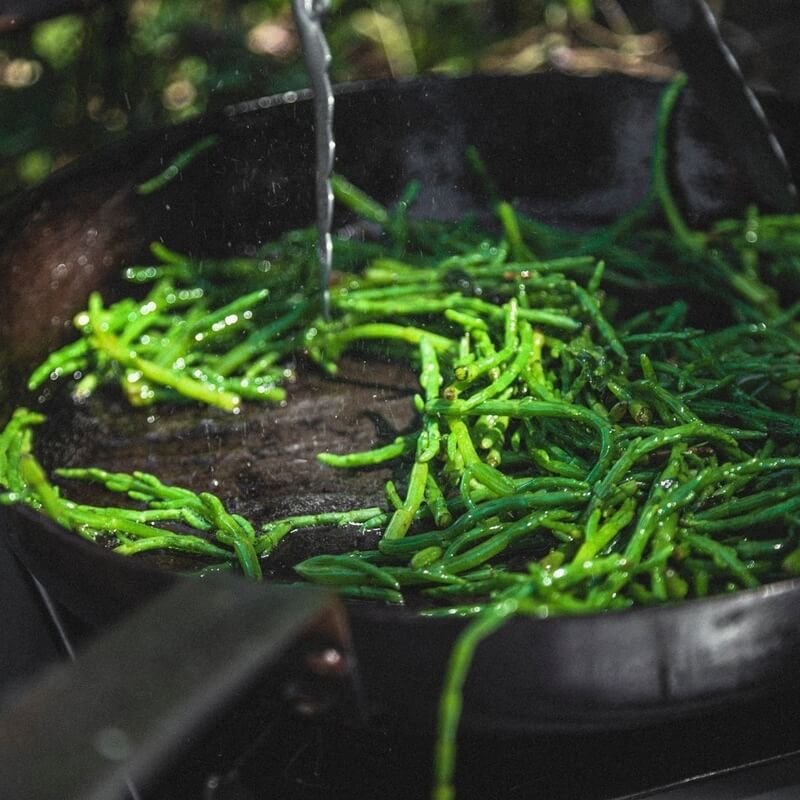 Image 1 of 2
Image 1 of 2

 Image 2 of 2
Image 2 of 2

Samphire ( sea asparagus)
Samphire is a succulent green plant, growing in bunches about 10-30 cm tall. The name “samphire” is derived from the French “Saint Pierre”, which is a patron of fishermen. The difference between the two types of samphire is the habitat– marsh samphire and rocky samphire. Treated as a vegetable the ‘sea asparagus’ is a summer favorite for its salty and fresh flavour that can be served on its own or used as a garnish. The young growing tips are carminative, depurative, digestive and diuretic, with high vitamin C and mineral content.
Regular samphire intake is one way to get enough potassium which may help lower systolic blood pressure, lower bad cholesterol level, regulate heartbeat and help keep cardiovascular diseases in check. Potassium is known to counter the effects of excess sodium in order to normalize blood pressure by reducing the tensions in the walls of blood vessels.
Also, the moderate amount of dietary iron in samphire may assist in the transportation of oxygen from the lungs to the rest of the body with a reduction in the risk of diseases such as anemia. Iron is important to the metabolism for the production of red blood cells which further promotes growth and maintains health.
Samphire is a succulent green plant, growing in bunches about 10-30 cm tall. The name “samphire” is derived from the French “Saint Pierre”, which is a patron of fishermen. The difference between the two types of samphire is the habitat– marsh samphire and rocky samphire. Treated as a vegetable the ‘sea asparagus’ is a summer favorite for its salty and fresh flavour that can be served on its own or used as a garnish. The young growing tips are carminative, depurative, digestive and diuretic, with high vitamin C and mineral content.
Regular samphire intake is one way to get enough potassium which may help lower systolic blood pressure, lower bad cholesterol level, regulate heartbeat and help keep cardiovascular diseases in check. Potassium is known to counter the effects of excess sodium in order to normalize blood pressure by reducing the tensions in the walls of blood vessels.
Also, the moderate amount of dietary iron in samphire may assist in the transportation of oxygen from the lungs to the rest of the body with a reduction in the risk of diseases such as anemia. Iron is important to the metabolism for the production of red blood cells which further promotes growth and maintains health.
Samphire is a succulent green plant, growing in bunches about 10-30 cm tall. The name “samphire” is derived from the French “Saint Pierre”, which is a patron of fishermen. The difference between the two types of samphire is the habitat– marsh samphire and rocky samphire. Treated as a vegetable the ‘sea asparagus’ is a summer favorite for its salty and fresh flavour that can be served on its own or used as a garnish. The young growing tips are carminative, depurative, digestive and diuretic, with high vitamin C and mineral content.
Regular samphire intake is one way to get enough potassium which may help lower systolic blood pressure, lower bad cholesterol level, regulate heartbeat and help keep cardiovascular diseases in check. Potassium is known to counter the effects of excess sodium in order to normalize blood pressure by reducing the tensions in the walls of blood vessels.
Also, the moderate amount of dietary iron in samphire may assist in the transportation of oxygen from the lungs to the rest of the body with a reduction in the risk of diseases such as anemia. Iron is important to the metabolism for the production of red blood cells which further promotes growth and maintains health.



